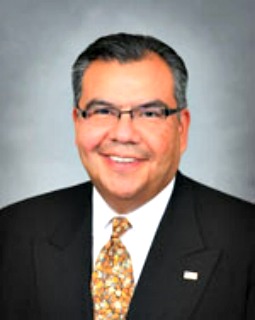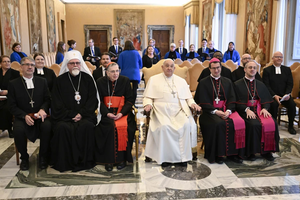Are Religious-Freedom Advocates ‘Christian Supremacists’?
NEWS ANALYSIS: A new report from the U.S. Civil Rights Commission, and related comments by its chairman, have sown fears that people of faith are being smeared as bigots.

WASHINGTON — Amid an election-year debate over “transgender bathroom rights” and conscience protections for those who oppose same-sex “marriage” on religious grounds, the U.S. Commission on Civil Rights (USCCR) issued a new report that has only deepened the acrimony and sowed fears that people of faith are being smeared as bigots.
The report, “Peaceful Coexistence: Reconciling Nondiscrimination Principles With Civil Liberties,” offers legal guidance on “adjudicating claims for religious exemptions from otherwise applicable nondiscrimination law.”
The commission concludes that antidiscrimination laws should be given greater weight in such cases and framed religious freedom as a threat to civil rights.

“Civil-rights protections ensuring nondiscrimination, as embodied in the Constitution, laws and policies, are of pre-eminent importance in American jurisprudence,” states the commission’s first finding.
“Religious exemptions to the protections of civil rights based upon classifications such as race, color, national origin, sex, disability status, sexual orientation and gender identity, when they are permissible, significantly infringe upon these civil rights,” read the second finding.
But when the report was released on Sept. 7, it was the intemperate comments by Martin Castro, the chairman of the U.S. Civil Rights Commission, that left many religious-freedom advocates shaken and dismayed.
“The phrases ‘religious liberty’ and ‘religious freedom’ will stand for nothing except hypocrisy so long as they remain code words for discrimination, intolerance, racism, sexism, homophobia, Islamophobia, Christian supremacy or any form of intolerance,” said Castro, an Obama appointee, in a separate statement that marked the report’s release.
Castro headed his statement with a quote he attributed to John Adams: “The government of the United States is not, in any sense, founded on the Christian religion.”
Archbishop Lori
Archbishop William Lori of Baltimore, the U.S. bishops’ point man on religious freedom, strongly criticized Castro’s comments in a Sept. 13 statement issued by the U.S. Conference of Catholic Bishops.
“These statements painting those who support religious freedom with the broad brush of bigotry are reckless and reveal a profound disregard for the religious foundations of his own work,” said Archbishop Lori.
While Archbishop Lori acknowledged religious believers have, at times, adopted mistaken policies, “We have long taught that the one God, maker of heaven and earth, calls each and every individual into being, loves every individual and commands believers to love and show mercy to every individual.”
“The idea of equality, which the chairman treats as a kind of talisman, is incomprehensible apart from the very faith that he seeks to cut off from mainstream society,” he said, noting that Catholic institutions have benefited all of American society, especially the neediest.
‘Partisan Talking Point’
Richard Garnett, an expert on the U.S. Constitution at the University of Notre Dame Law School, dismissed Castro’s statement as a “partisan talking point.”
“The key point that Chairman Castro’s statement fails to appreciate is that ‘religious freedom’ is not in tension or competition with ‘civil rights’ — it is a civil right,” Garnett told the Register.
“Of course, we often face the challenge, in a pluralistic and changing society, of balancing rights and interests. This challenge is not helped by painting and dismissing those with different views as bigots.”
Four years ago, after the U.S. bishops and other religious leaders signaled their opposition to the HHS contraceptive mandate, Church leaders and their allies in Congress were attacked for waging a “war on women.” During this election year, according to Commissioner Castro, religious liberty is a code word for bigotry in all forms, from racism to sexism and Islamophobia to homophobia.
Indeed, just days after Castro issued his scathing critique of conscience protections for Christians, Hillary Clinton, the Democratic presidential nominee, issued an indictment of GOP presidential candidate Donald Trump’s supporters and managed to smear religious opponents of marriage equality in the process.
At a Sept. 9 fundraiser sponsored by “LGBT for Hillary,” Clinton said that half of Trump’s supporters were “racist, sexist, homophobic, xenophobic, Islamophobic.”
As further evidence of this alleged bigotry, Clinton pointed to Trump’s proposed list of U.S. Supreme Court nominees and his selection of Indiana Gov. Mike Pence as his running mate. She charged that the jurists on Trump’s list would seek to overturn same-sex “marriage” and that Pence had approved a state Religious Freedom Restoration Act that would strengthen exemptions for those who opposed marriage equality.
Clinton later apologized for the sweeping nature of her attack on Trump’s supporters, but the scripted statement at the fundraiser revealed that she was prepared to frame opposition to same-sex “marriage” as extreme, possibly unlawful behavior.
Clinton did not echo Castro’s attack on “Christian supremacy”; however, nor did she reference the quote attributed to John Adams that appeared at the top of Castro’s statement.
Shift in Tolerance
Castro’s suggestion that advocates of religious freedom seek to impose Christianity on nonbelievers stands in sharp contrast to the U.S. bishops’ firm opposition to policies that could marginalize Muslims, especially in the wake of rising public fears of terror attacks organized by supporters of the Islamic State.
“Watching innocent lives taken and wondering whether the violence will reach our own families rightly stirs our deepest protective emotions. We must resist the hatred and suspicion that leads to policies of discrimination,” said Archbishop Joseph Kurtz of Louisville, Ky., the U.S. bishops’ conference’s president, in a statement last December.
“Instead, we must channel our emotions of concern and protection, born in love, into a vibrant witness to the dignity of every person. We should employ immigration laws that are humane and keep us safe, but should never target specific classes of persons based on religion.”
Evangelical leaders have also made clear that free exercise rights cannot be reserved for one group of believers, and they have spoken out against efforts to bar the building of mosques.
"Those voices (though a distinct minority, to be sure) that claim to be Christian but seek to restrict religious freedom for others are perhaps unknowingly on a campaign to destroy religious liberty," Russell Moore, president of the Ethics & Religious Liberty Commission of the Southern Baptist Convention has warned.
"They would set the precedents that will be used to destroy churches, and they will give the opponents of religious liberty the charge that the issue isn’t about freedom at all but about seeking government approval of one’s religion."
The Becket Fund for Religious Liberty, a public interest group that has represented Hobby Lobby, the Little Sisters of the Poor and the Eternal Word Television Network (EWTN), the parent company of the Register, in their legal challenges to the HHS mandate, has also represented Muslims, Buddhists and other religious minorities.
However, the U.S. public's understanding and respect for religious freedom as a fundamental right has steadily shifted in recent years.
Roger Severino, a legal scholar at the Heritage Foundation, noted that Clinton’s husband, former President Bill Clinton, had signed the federal Religious Freedom Restoration Act (RFRA) in 1993, after it received strong bipartisan support in Congress. But later, Democrats began to reassess the RFRA, after state versions of the federal law were attacked as a stealth strategy for protecting the conscience rights of religious believers who opposed same-sex “marriage.”
“Having redefined marriage, activists on the left are not content to live and let live; instead, they want people of faith to change their reasoned beliefs about sexual morality or be excluded from the public square, fired or sued out of a livelihood by force of law,” said Severino.
“That is not a tolerant vision for society, and, unfortunately, the commission’s biased report only invites further division.”
However, Douglas Laycock, a leading authority on religious freedom at the University of Virginia Law School, offered a more nuanced view of Castro’s remarks.
“The chairman’s statement describes the political consequences of religious conservatives’ persistent opposition to same-sex marriage, gay rights, contraception, emergency contraception, abortion and, sometimes, Muslims,” Laycock told the Register.
“That is how religious liberty is now viewed by much of the country — as a code word for ‘discrimination’ and for restricting the liberty of everyone else.”
That said, he suggested that Castro’s comments reflect a common but incorrect tendency to equate requests for exemptions from participating in same-sex weddings with “discriminating against gays in all contexts.”
Further, Laycock bluntly dismissed the substance of the commission’s report as “terrible.”
“The report is terrible, and it offers no principled reason for coming down on the side of antidiscrimination laws in every case, with no exemptions. It just chooses a side,” said Laycock.
Some Commissioners Disagree
Even on the commission itself, some members expressed strong disagreement with the conclusions “Peaceful Coexistence” draws about the correct balance between religious liberty and nondiscrimination laws.
In March 2013, the commission invited legal specialists to participate in a panel that addressed this subject, and the lengthy report features the scholars’ statements, as well as the commission’s findings and recommendations.
“Overly broad religious exemptions unduly burden nondiscrimination laws and policies,” reads the report’s first recommendation
“Federal and state courts, lawmakers and policy makers at every level must tailor religious exceptions to civil liberties and civil-rights protections as narrowly as applicable law requires.”
Another recommendation also seeks to mitigate free-exercise rights.
“Federal legislation should be considered to clarify that RFRA creates First Amendment Free-Exercise Clause rights only for individuals and religious institutions and only to the extent that they do not unduly burden civil liberties and civil-rights protections against status-based discrimination,” reads the fourth recommendation.
Commissioner Peter Kirsanow, a Republican appointed by Congress, called the findings and recommendations “an alarm to liberty-loving Americans” in a lengthy statement included in the report.
Kirsanow noted that the tension between religious liberty and nondiscrimination principles “appears most acute when religious liberty and sexual liberty conflict.”
Commissioner Gail Heriot, a professor at the University of San Diego School of Law, was also critical of the report. And she predicted that free-exercise rights would face additional hurdles as government regulations multiply.
“The bigger and more complex government becomes, the more conflicts between religious conscience and the duty to comply with the law we can expect,” said Heriot in her rebuttal to the commission’s recommendations.
Ignoring Congress?
Heriot contended that when the majority of commissioners recommended further “clarity” and more narrowly tailored religious-freedom statutes, they ignored the fact that Congress had already spoken. The Religious Freedom Restoration Act already provides the blueprint for a proper balance of respect for sincerely held religious beliefs with government interests, she explained.
“When is a religious accommodation an undue burden on a law prohibiting status-based discrimination?” asked Heriot.
“Congress has created a standard under which the answer to that question will be hardly ever.”
The conflicts within the commission mirror a broader partisan debate on the value of religious liberty. And with almost two months to go before the November election, there is every reason to expect that advocates for the "first freedom" will remain a target.
That means Church leaders like Archbishop Lori must press ahead with their campaign to secure breathing room for religious believers and institutions who adhere to teachings that are incompatible with new sexual liberties.
“In a pluralistic society, there will be institutions with views at odds with popular opinion," said Archbishop Lori, in his response to Commissioner Castro's remarks.
"We respect those who disagree with what we teach. Can they respect us?”
Joan Frawley Desmond is the Register’s senior editor.
















